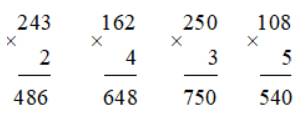(x+2)5=243
NN
Những câu hỏi liên quan
Tính bằng cách thuận tiện nhất:
243 x 2 + 5 x 243 x 486 x 2 - 243
=243x2+4x243+486x2-243
=2x243+5x243+2x2x243-243
=7x243+4x243-1x243
=11x243-1x243
=10x243
=2430
243 x 2 + 5 x 243 + 486 x 2 - 473
TÍNH NHANH !!!!!
= 243 x 2 + 5 x 243 + 243 x 2 x 2 - 473
= 243 x (2+5+2x2) - 473
= 243 x 28 - 473
= 6084 - 473
= 6331
Đúng 0
Bình luận (0)
= 243 * (2+5+4) -473
=243 * 10 - 230
=2430 -230
=2200
Tính:
975 : 5=
243 x 2 =
109 x 6 =
Tính:
975 : 5= 195
243 x 2 = 468
109 x 6 = 654
Đúng 0
Bình luận (0)
Tìm x, biết:
a) \(\dfrac{x}{3}\) - 5 = \(\dfrac{2x}{5}\)
b) 4 + 3x = 8 - x
c) 2 . 3\(^{x+1}\) - 5 . 3\(^x\) = 243
a: =>1/3x-2/5x=5
=>-1/15x=5
=>x=-75
b: =>4x=4
=>x=1
c: =>6*3^x-5*3^x=243
=>3^x=243
=>x=5
Đúng 0
Bình luận (0)
a) 32x-1= 243 b) (3x)2 :33= 1/243
c) 23x+2= 4x+5 d) 3x+1= 9x
a) \(3^{2x-1}=243\)
\(\Leftrightarrow3^{2x-1}=3^5\)
\(\Leftrightarrow2x-1=5\)
\(\Leftrightarrow2x=5+1\)
\(\Leftrightarrow2x=6\)
\(\Leftrightarrow x=\dfrac{6}{2}\)
\(\Leftrightarrow x=3\)
Vậy \(x=3\)
b) \(\left(3^x\right)^2:3^3=\dfrac{1}{243}\)
\(\Leftrightarrow3^{2x}:3^3=\dfrac{1}{3^5}\)
\(\Leftrightarrow3^{2x}:3^3=3^{-5}\)
\(\Leftrightarrow3^{2x-3}=3^{-5}\)
\(\Leftrightarrow2x-3=-5\)
\(\Leftrightarrow2x=-5+3\)
\(\Leftrightarrow2x=-2\)
\(\Leftrightarrow x=-\dfrac{2}{2}\)
\(\Leftrightarrow x=1\)
Vậy \(x=1\)
c) \(2^{3x+2}=4^{x+5}\)
\(\Leftrightarrow2^{3x+2}=\left(2^2\right)^{x+5}\)
\(\Leftrightarrow2^{3x+2}=2^{2\left(x+5\right)}\)
\(\Leftrightarrow3x+2=2\left(x+5\right)\)
\(\Leftrightarrow3x+2=2x+10\)
\(\Leftrightarrow3x-2x=10-2\)
\(\Leftrightarrow x=8\)
Vậy \(x=8\)
d) \(3^{x+1}=9^x\)
\(\Leftrightarrow3^{x+1}=\left(3^2\right)^x\)
\(\Leftrightarrow3^{x+1}=3^{2x}\)
\(\Leftrightarrow x+1=2x\)
\(\Leftrightarrow2x-x=1\)
\(\Leftrightarrow x=1\)
Vậy \(x=1\)
Đúng 0
Bình luận (0)
a, (2x-3)2=16
b, (3x-2)5=-243
c, (x-7)x+1=(x-7)x+11
a) \(\left(2x-3\right)^2=16\)
\(\left(2x-3\right)^2=4^2\)
\(2x-3=4\)
\(2x=7\)
\(x=\dfrac{7}{2}=3,5\)
b) \(\left(3x-2\right)^5=-243\)
\(\left(3x-2\right)^5=-3^5\)
\(3x-2=-3\)
\(3x=-1\)
\(3x=-\dfrac{1}{3}\)
c) \(\left(x-7\right)^{x+1}=\left(x-7\right)^{x+11}\)
\(\left(x-7\right)^{x+1}-\left(x-7\right)^{x+11}=0\)
\(\left(x-7\right)^{x+1}\times\left[1-\left(x-7\right)^{10}\right]=0\)
\(\left(x-7\right)^{x+1}=0\) ; \(1-\left(x-7\right)^{10}=0\)
\(x-7=0;\left(x-7\right)^{10}=1\)
\(x=7;\left(x-7=1;x-7=-1\right)\)
\(x=7;x=8;x=6\)
Đúng 1
Bình luận (0)
a, (2\(x\) - 3)2 = 16
\(\left[{}\begin{matrix}2x-3=-4\\2x-3=4\end{matrix}\right.\)
\(\left[{}\begin{matrix}2x=-1\\2x=7\end{matrix}\right.\)
\(\left[{}\begin{matrix}x=-\dfrac{1}{2}\\x=\dfrac{7}{2}\end{matrix}\right.\)
Vậy \(x\in\){ - \(\dfrac{1}{2}\); \(\dfrac{7}{2}\)}
b, (3\(x\) - 2)5 = -243
( 3\(x\) - 2)5 = (-3)5
3\(x\) - 2 = -3
3 \(x\) = -1
\(x\) = - \(\dfrac{1}{3}\)
Vậy \(x\) = -\(\dfrac{1}{3}\)
c, \(\left(x-7\right)\)\(x+1\) = (\(x-7\))\(x+11\)
(\(x-7\))\(^{x+1}\).( \(\left(x-7\right)^{10}\) - 1 ) = 0
\(\left[{}\begin{matrix}\left(x-7\right)^{x+1}=0\\\left(x-7\right)^{10}=1\end{matrix}\right.\)
\(\left[{}\begin{matrix}x=7\\x-7=-1\\x-7=1\end{matrix}\right.\)
\(\left[{}\begin{matrix}x=7\\x=6\\x=8\end{matrix}\right.\)
Vậy \(x\in\){ 6; 7; 8}
Đúng 0
Bình luận (0)
Câu a mình thiếu 2 trường hợp
\(\left(2x-3\right)^2=16\)
\(\left(2x-3\right)^{ 2}=4^2\)
\(2x-3=4;2x-3=-4\)
\(2x=7;2x=-1\)
\(x=\dfrac{7}{2};x=-\dfrac{1}{2}\)
Đúng 0
Bình luận (0)
Đặt tính rồi tính.
243 x 2 162 x 4 250 x 3 108 x 5
a)\(3^{-1}\).\(4^x\)=\(\dfrac{5}{3}.2^7\)
b) \(9^{-x}\).\(27^x\)=243
a: =>4^x=640
=>\(x\in\varnothing\)
b: =>\(3^{-2x}\cdot3^{3x}=243\)
=>3^x=243
=>x=5
Đúng 0
Bình luận (0)
1/ 6^x-3=1
2/ 5^x-2=125
3/ 5^x-2=25
4/ 3^x+4=243






